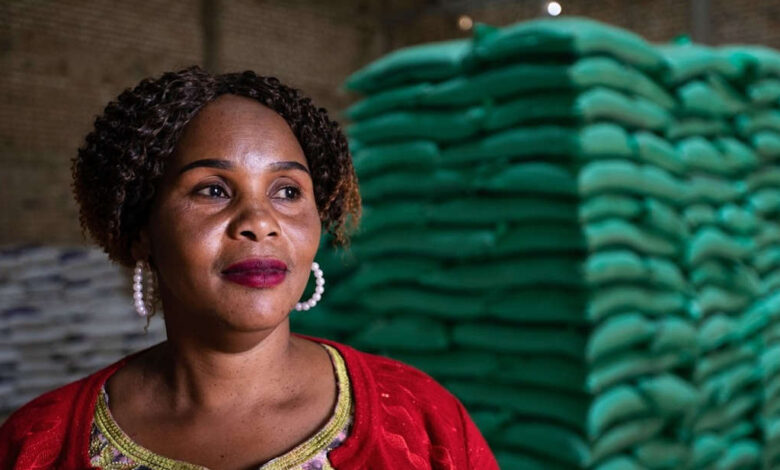As the morning mist rises over the rolling hills of Tanzania’s Southern Highlands, Tumaini Kilawa carefully paces through the rows of her cabbage. Cabbage is a heavy feeder, quickly depleting the soil of required nutrients. Tumaini often sprinkles fertiliser beads on her field to maximise production, as these additional nutrients are essential for her crops to grow.
In Tanzania, the agriculture system is characterised by dry land and erratic rainfall, limiting productivity and contributing to land degradation, leaving smallholder farmers like Tumaini vulnerable to various shocks. Under such conditions, there is a need for the optimum use of yield boosters, particularly fertilizer, to mitigate farmers’ losses and reduce poverty.
To ensure that Tumaini and her fellow have access to much-needed fertilizer, from the factory to the farm gate, the African Development Bank and a local implementing partner have set up a $2.4 million credit guarantee scheme under the Africa Fertilizer Financing Mechanism. The facility supports three fertilizer suppliers and 30 hub agro-dealers, facilitating access to quality fertilizer for 966 retail agro-dealers and 570,239 smallholder farmers.
Fideline Mahenge, a local distributor of agricultural inputs, also called a hub agro-dealer, started her business in 2001. “I was passionate with the farm input agency because I wanted to help farmers produce. Here in Mafinga, 85% of the people are farmers. But the big challenge is the lack of farm inputs, particularly fertilizers. So I started my business with small capital. But when I tried to reach out to different fertiliser suppliers, they could not support me. Due to my small capital, they did not trust me,” said Fideline, a distributor in Mafinga in the Iringa Region.
Fertilizers and other farm inputs are distributed throughout the country via hub and rural agro-dealers. For this system to work, fertilizer companies must supply the distribution network on time and in sufficient quantities. But many of the companies have been reluctant to do business with the agro-dealers, who are often not deemed creditworthy. Many companies prefer distributors who pay cash or have bank guarantees to back their purchases.
But with high bank loan interest rates, many agro-dealers cannot mobilize adequate funds to meet the growing needs of farmers. Due to shrinking profits, the number of agro-dealers also declined over the years.
The Africa Fertilizer Financing Mechanism intervention has encouraged suppliers and agro-dealers to sign agricultural partnership contracts, paving the way to stronger relationships throughout the agricultural value chain. Under the scheme, more than 57,000 tonnes of fertilizer worth $26 million have been traded so far.
“With the trade credit guarantee project, we can do more sales because we are assured of the payment in case of a default from the distributor,” said Januari Fabiani, financial manager at fertiliser supplier Yara in Tanzania.
Guavay, a Tanzanian private fertilizer company, says the scheme has boosted its credit sales by more than 60%. “This program has increased our confidence to extend credit and encouraged us to supply our dealers with big volumes of fertilizers. And with this, we believe it will give us the confidence to extend it to other dealers who are not yet in this program,” said its general manager, William Azalia.
William Azalia, General Manager of Guavay, and his colleague controlling fertiliser stocks in one of their warehouses.
Besides fostering a trusting business environment with credit guarantees, the project also helped improve the business skills of hub agro-dealers. They were trained in business management with a focus on working capital, management of stocks, record keeping, and social and environmental safeguards.
The fast-tracking of farmers’ access to fertilizers is enhancing Tanzania’s agricultural value chain. For agro-dealers like Fideline the improvements have been tangible. She has managed to supply approximately 12,000 farmers in 2020 and now employs nine young people in Mafinga.
Fideline Mahenge’s business is thriving and she is now in a position to recruit young people.
Fideline can now confidently take on the challenge that pushed her to start her business in the first place: helping farmers produce. At the same time, she can empower herself and set an example for all those looking to take part in Tanzania’s thriving agricultural sector.



